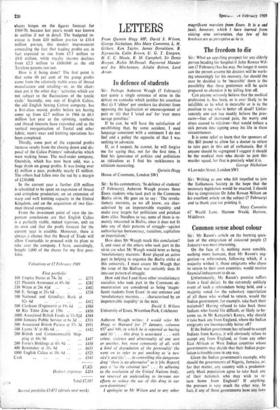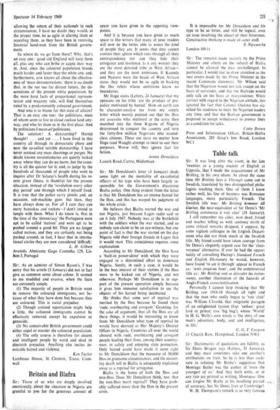Common sense about colour " Sir : Mr Raven's article
on the burning ques- tion of the emigration of coloured-people (3 January) was most interesting.
On the face of it, nothing more sensible, nothing more humane, than Mr Raven's sug- gestion—a referendum, following which, if a majority wished it, those emigrants who chose to return to their own countries, would receive financial inducement to do so.
pnfortunately, Mr Raven's premise suffers from a fatal defect. In the extremely unlikely event of such a referendum being held, and a majority voted for the voluntary repatriation of all those who wished to return, would the Indian government, for example, take back their nationals? Having refused to take back those Indians who found life difficult, or likely to be- come so, in Mr Kenyatta's Kenya, why should it take back any from England, where the Indian emigrants are incomparably better off?
If the Indian government has refused to accept Indians from Kenya, it will obviously refuse to accept any from England, or from any other East African or West Indian countries whose governments may decide that their Indian popu- lation is troublesome in any way.
Given the Indian government's example, why should the governments of Nigeria, Jamaica, or, for that matter, any country with a predomin- antly black population agree to take back any of their nationals who may wish to re- turn home from England? If anything, the pressure is very much the other way. In fact, if any of those governments have any laws allowing the return of' their nationals in such circumstances, 1 have no doubt they would, at the proper time, be as agile in altering them or repealing them, as they have been in receiving financial hand-outs from the British govern- ment.
So where do we go from there? Why, that's an easy one: good old England will keep them all, plus any who can bribe or cajole their way in. And, since the coloured population breeds Much harder and faster than the white one, and, furthermore, now knows all about the effective- ness of 'mass demonstrations,' there is no doubt that, in the not too far distant future, the de- scendants of the present white population, by the mere hard facts of proportional represen- tation and majority rule, will find themselves ruled by a predominantly coloured government.
And who is to blame for this state of affairs? That is an easy one too: the politicians, most of whom seem to live in cloud cuckoo land any- way, and who let them in in the first place. And by politicians [mean all politicians.
The solution? A dictatorship? Horrid thought! . . . and yet . . I have lived in this country all through its democratic phase and now the so-called terrible dictatorship. I have nevet noticed any mass shootings or purges. No dUubt -known revolutionaries are quietly locked away where they can da no harm, but the coun- try is all the quieter for it, and, to judge by the hundreds of thousands of people who went to inquire after Dr Salazar's health during his re- cent grave illness, is thankful for the present Situation, instead of the 'revolution every other day period' and through which I myself 'lived. It is true that the police carry pistols and, on occasion, sub-machine guns but then, they have always done so. For all I care they can carry bazookas and rockets—I don't intend to tangle with them. What I do know is, that in the time of the 'democracy' the Portuguese were apt to be called 'natives' and were apt to be pushed around a good' bit. They are no longer called natives, and they are certainly not being pushed around, in fact, I hear that in interna- tional circles they are now considered 'difficult.'
L. H. Gilbert Avenida Almirante Gago Coutinho 129, Lis- bon 5, Portugal



































 Previous page
Previous page